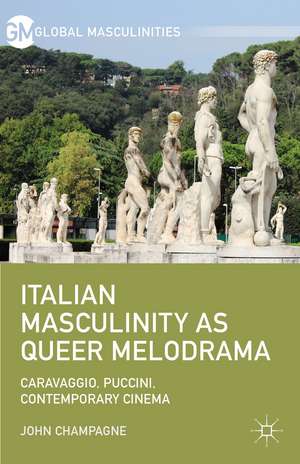Italian Masculinity as Queer Melodrama: Caravaggio, Puccini, Contemporary Cinema: Global Masculinities
Autor John Champagneen Limba Engleză Hardback – 17 feb 2015
| Toate formatele și edițiile | Preț | Express |
|---|---|---|
| Paperback (1) | 384.31 lei 6-8 săpt. | |
| Palgrave Macmillan US – 8 noi 2015 | 384.31 lei 6-8 săpt. | |
| Hardback (1) | 388.72 lei 6-8 săpt. | |
| Palgrave Macmillan US – 17 feb 2015 | 388.72 lei 6-8 săpt. |
Din seria Global Masculinities
- 13%
 Preț: 236.84 lei
Preț: 236.84 lei - 14%
 Preț: 171.64 lei
Preț: 171.64 lei - 13%
 Preț: 238.11 lei
Preț: 238.11 lei - 13%
 Preț: 236.92 lei
Preț: 236.92 lei -
 Preț: 381.98 lei
Preț: 381.98 lei -
 Preț: 390.63 lei
Preț: 390.63 lei -
 Preț: 385.84 lei
Preț: 385.84 lei -
 Preț: 387.75 lei
Preț: 387.75 lei - 15%
 Preț: 493.21 lei
Preț: 493.21 lei -
 Preț: 383.93 lei
Preț: 383.93 lei - 15%
 Preț: 640.71 lei
Preț: 640.71 lei -
 Preț: 384.86 lei
Preț: 384.86 lei -
 Preț: 387.75 lei
Preț: 387.75 lei -
 Preț: 390.63 lei
Preț: 390.63 lei -
 Preț: 388.72 lei
Preț: 388.72 lei - 15%
 Preț: 641.85 lei
Preț: 641.85 lei - 15%
 Preț: 697.32 lei
Preț: 697.32 lei - 15%
 Preț: 646.11 lei
Preț: 646.11 lei -
 Preț: 432.71 lei
Preț: 432.71 lei - 15%
 Preț: 465.80 lei
Preț: 465.80 lei - 15%
 Preț: 693.06 lei
Preț: 693.06 lei - 18%
 Preț: 729.68 lei
Preț: 729.68 lei -
 Preț: 352.63 lei
Preț: 352.63 lei -
 Preț: 392.60 lei
Preț: 392.60 lei -
 Preț: 387.38 lei
Preț: 387.38 lei -
 Preț: 390.63 lei
Preț: 390.63 lei - 8%
 Preț: 386.06 lei
Preț: 386.06 lei
Preț: 388.72 lei
Nou
Puncte Express: 583
Preț estimativ în valută:
74.38€ • 77.87$ • 61.55£
74.38€ • 77.87$ • 61.55£
Carte tipărită la comandă
Livrare economică 05-19 aprilie
Preluare comenzi: 021 569.72.76
Specificații
ISBN-13: 9781137474803
ISBN-10: 1137474807
Pagini: 266
Ilustrații: XII, 266 p.
Dimensiuni: 140 x 216 x 23 mm
Greutate: 0.43 kg
Ediția:2015
Editura: Palgrave Macmillan US
Colecția Palgrave Macmillan
Seria Global Masculinities
Locul publicării:New York, United States
ISBN-10: 1137474807
Pagini: 266
Ilustrații: XII, 266 p.
Dimensiuni: 140 x 216 x 23 mm
Greutate: 0.43 kg
Ediția:2015
Editura: Palgrave Macmillan US
Colecția Palgrave Macmillan
Seria Global Masculinities
Locul publicării:New York, United States
Cuprins
Introduction: Italian Masculinity and Melodrama 1. Caravaggio and the Melodramatic Sensibility 2. Caravaggio's Melodramatic Male Bodies 3. Tosca and Social Melodrama 4. Puccini's Sparrow: Longing and La Rondine 5. "Normality . . . what an ugly word!": Contemporary Queer Melodrama 6. Özpetek's Queer Cinema Conclusion
Recenzii
"Champagne's book offers a different perspective on questions of identity and difference through his focus on the queer melodramatic. He links the music (melos) of melodrama to theatrics as expressed through his discussions of theater, lyric opera, film, and painting. While cinema has been a focus of critical writing on gender and sexuality, especially in relation to women, opera and painting have been considered separately and differently. Now, Champagne's book brings these art forms into dialogue about bodies, especially, but not exclusively, masculine bodies. The book, through these exemplary figures and forms from different moments in time, offers a historical perspective on masculinity and melodrama." - Marcia Landy, Distinguished Professor of English and Film Studies, University of Pittsburgh, USA
"Champagne does an excellent job of returning to previous explored areas of Italian masculinity and melodrama to present new ways of seeing what earlier scholars have either ignored or overlooked in some of the most studied works of art. He devises a trajectory that extends his argument over media, time and place, and in the process helps us to see beyond the studies that he builds upon, and which he skillfully transcends. The result establishes Italian Masculinity as Queer Melodrama as the new standard in terms of analyzing Italian melodrama." - Fred Gardaphe, Distinguished Professor of English and Italian American Studies, Queens College, CUNY, USA
"This study's bold confrontation of Italian masculinity and melodrama invites us to rewrite our understandings of both. Through gendered and queer readings of Caravaggio's paintings, Puccini's operas, and contemporary gay filmmakers, John Champagne places longstanding questions regarding Italian culture at the cutting edge of modern intellectual debate. Presenting the thesis that melodrama was an Italian invention, and part of a 'polyphonic' masculinity, this book gives body to such elusive topics as the relation of stereotype to nation, expressivity to erotics, and the historicisation of a sensibility." - Louis Bayman, Teaching Fellow of Film and Television Studies, University of Warwick, UK
"Champagne does an excellent job of returning to previous explored areas of Italian masculinity and melodrama to present new ways of seeing what earlier scholars have either ignored or overlooked in some of the most studied works of art. He devises a trajectory that extends his argument over media, time and place, and in the process helps us to see beyond the studies that he builds upon, and which he skillfully transcends. The result establishes Italian Masculinity as Queer Melodrama as the new standard in terms of analyzing Italian melodrama." - Fred Gardaphe, Distinguished Professor of English and Italian American Studies, Queens College, CUNY, USA
"This study's bold confrontation of Italian masculinity and melodrama invites us to rewrite our understandings of both. Through gendered and queer readings of Caravaggio's paintings, Puccini's operas, and contemporary gay filmmakers, John Champagne places longstanding questions regarding Italian culture at the cutting edge of modern intellectual debate. Presenting the thesis that melodrama was an Italian invention, and part of a 'polyphonic' masculinity, this book gives body to such elusive topics as the relation of stereotype to nation, expressivity to erotics, and the historicisation of a sensibility." - Louis Bayman, Teaching Fellow of Film and Television Studies, University of Warwick, UK
Notă biografică
John Champagne is Professor of English at Penn State Erie, The Behrend College, USA.






